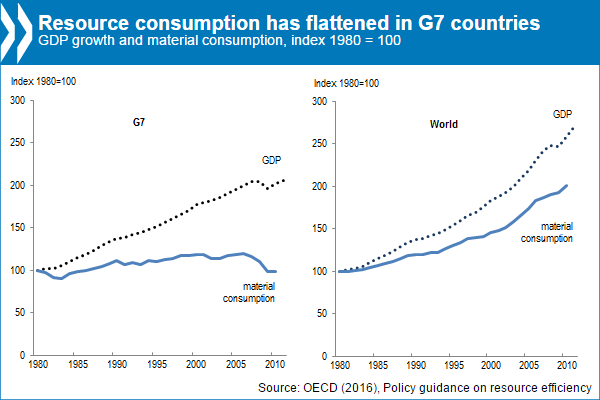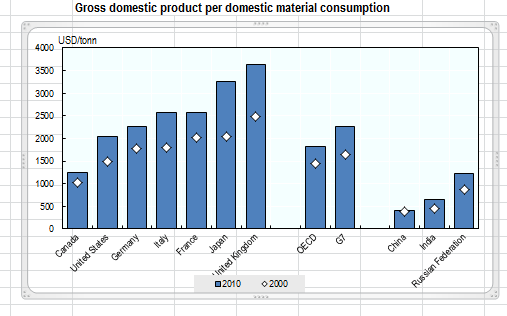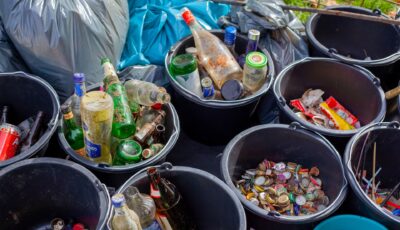Doing more with less. Advanced countries must act on resource scarcity and waste.
May 17, 2016 – Advanced economies have reduced their consumption of raw materials and improved waste management, but more should be done to design and produce goods in a way that uses fewer natural resources and produces less waste, according to a new OECD report.
Resource consumption by Group of Seven countries has flattened out since 1980, despite economic growth, but their per capita consumption is still around 60% above the world average.
Soaring demand from developing and emerging countries, and rapid population growth, means global resource consumption could double by 2050, putting serious pressure on the environment.
Policy Guidance on Resource Efficiency, presented today to G7 Environment Ministers in Toyama, Japan, calls on governments to apply resource-efficiency policies to the entire life cycle of products and to align them with existing policies in areas like innovation, investment and trade. More harmonization of environmental labeling and information could also raise standards in resource efficiency, it says.

“Our objective has to be achieving a circular economy where we maintain the value of products and materials for as long as possible and we minimise waste generation. The challenge is to create more value from fewer natural resources,” said OECD Deputy Secretary-General Rintaro Tamaki.
“This is foremost a matter of national policy decisions, but our report also highlights the value of international co-operation in this area.”
Report calls for resource-efficiency policies to the entire life cycle of products and to align them with existing policies in areas like innovation, investment and trade.
The OECD report was released alongside a study by the International Resource Panel, a scientific body hosted by the United Nations Environment Programme, called Resource Efficiency: Potential and Economic Implications, which finds that resource efficiency policies could significantly reduce the projected rise in material consumption by 2050 and foster economic growth and employment.
The two reports respond to a G7 request in 2015 for policy guidance on resource efficiency.
While the overall annual per capita material consumption in OECD countries remains high – roughly 16.9 tonnes per person per year, the performance of individual countries varies widely.
For example, notes the report, in 2011 the economic value per material unit generated by the united kingdom was was almost three times that of Canada, while in India and China it is about half that of Canada. See figure below.
Canada Must Do More
While Canada gets high marks for its Extended Producer Responsibility Programs, the OECD report notes Canada does not have national targets for resource efficiency or waste reduction.

The OECD report finds that measures have been applied more to the downstream than the upstream part of products’ lifecycles.
For example, at the downstream end, higher landfill taxes have been effective at diverting waste into recycling and energy recovery, but too few incentives are in place to encourage greener product designs or more environmentally friendly consumer behaviour. It offers advice on extending policies to cover entire product lifecycles.
Other recommendations in the OECD report include:
- Strengthen and expand Extended Producer Responsibility schemes (already used by a majority of OECD countries in areas like electronic equipment, packaging and tyres) whereby manufacturers take responsibility for collecting and treating end-of-life products.
- Better integrate resource efficiency considerations into public procurement programmes.
- Encourage partnerships among businesses working along value chains so that, for example, one company’s waste can become another’s material input.
- Improve data collection and analysis so policies can be evaluated and improved.
Higher landfill taxes have been effective at diverting waste into recycling and energy recovery, but too few incentives are in place to encourage greener product designs or more environmentally friendly consumer behaviour.
This report responds to the request by G7 Leaders at the Schloss Elmau Summit in June 2015, for the OECD to develop policy guidance on resource efficiency.
Establishing a resource efficient economy is a major environmental, development and macroeconomic challenge today. Improving resource efficiency by putting in place policies that implement the principles of reduce, reuse, recycle (the 3Rs) is crucial to improving resource use, security and competitiveness while diminishing the associated environmental impacts.







